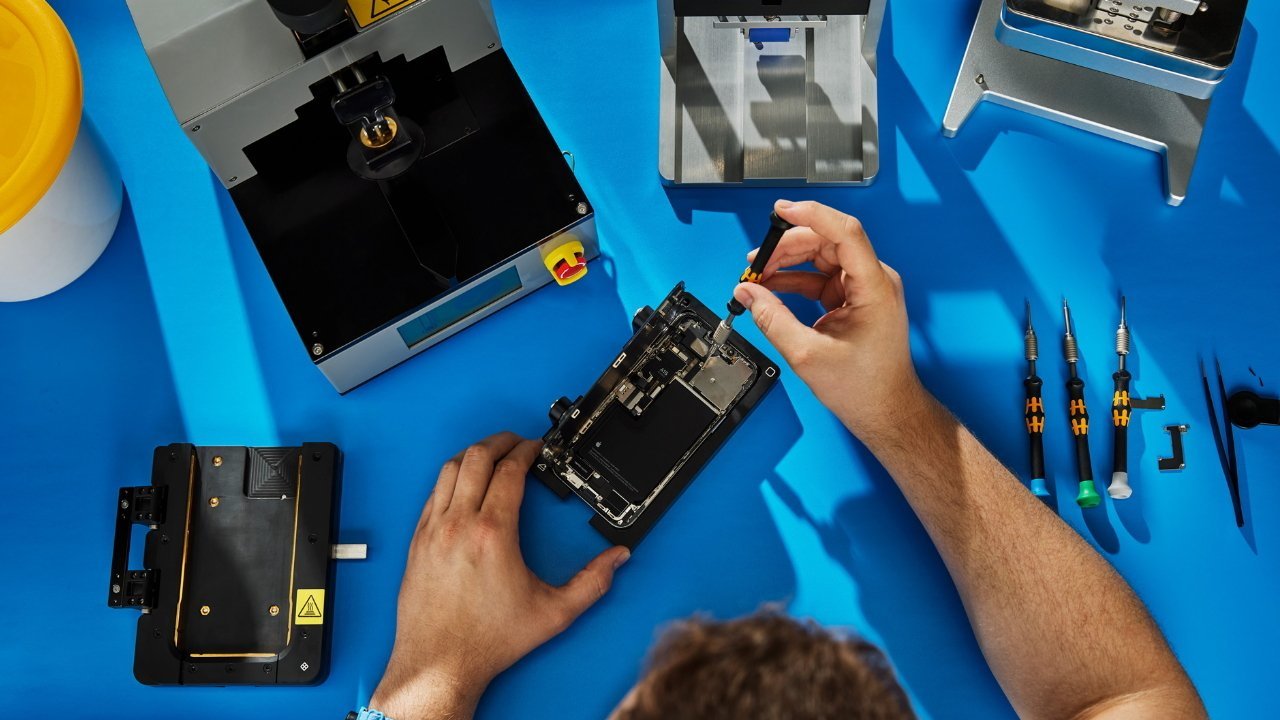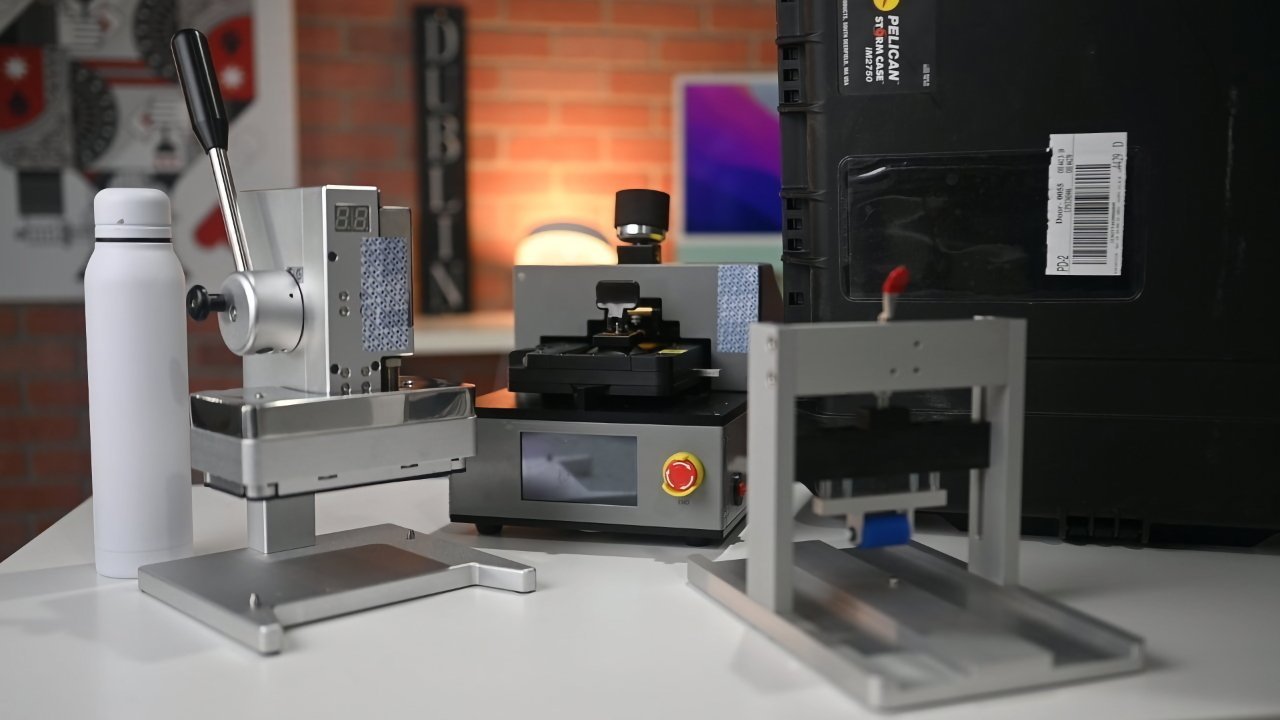Apple's repair policies aren't doing enough across the board to comply with New York's Right to Repair rules, with a new report claiming that Apple still has a lot more work to do.
In 2022, New York passed legislation that enshrined the Right to Repair for electronics. The intent was to make it easier for consumers to repair their hardware, by being granted access to parts, tools, and documents.
One year after the legislation came into force on hardware sold for the first time in New York, a report has attempted to determine its progress.
Scoring the hardware
Tuesday's report from the U.S. PIRG Education Fund examined user repair options for 21 products that are covered by the Right to Repair law. Of the collection, Apple is the producer with the most products listed, including an M3 MacBook Pro, an iPhone 15, and the Apple Vision Pro.
The top-scoring item of the three was the iPhone 15, which scored maximum points in the "Manual Score" and "Parts Score," earning it an A grade. The MacBook Pro managed a C grade, with 10 out of 10 for the Manual Score but zero for Parts.
The worst performing was the Apple Vision Pro, which didn't score any points at all. It was graded an F.
The Manual Score is based on whether consumers can acquire a service manual from the manufacturer's website. Only 15 out of the 21 devices surveyed had accessible manuals.
Those manuals were also scored based on whether they contained important repair information. This included a list of parts and tools, repair procedures, diagrams, and troubleshooting procedures.
Customer service confusion
While Apple did score top marks for the Manual element for two of the three devices, the report adds that it did still encounter problems.
Calls to customer service representatives sometimes resulted in the caller being told that there was no self-repair option for the iPhone 15, despite there being one available. A representative also said that "only trained Apple Technicians" could replace a phone screen or battery.
A rep said they were "bounded with Apple's policy," and that "Apple wants the best for you."
Apple does supply the parts and tools, as well as a full repair manual that can lead consumers through the repair themselves.
Company support agents for other firms also ran into trouble by not providing repair materials or information. They required a proof of purchase and a registered serial number before offering those details.
The firms caught up by product registration requirements included Canon, Amazon, Asus, and Microsoft.
Vision issues
When it comes to the relatively new technology of the Apple Vision Pro, its score was at zero. It did not have any service manual or spare parts available to use.
However, Apple isn't the only one to be tripped up with its headset. Meta scored a single point for the Manual score for the Meta Quest 3, and two for Parts, also getting a failing grade.
Meta said that it was "not offering repair as of the moment" for the headset, and that parts replacement wasn't an option either.
Recommendations to investigate
The report concludes with a list of recommendations, including proposing the New York Attorney General's office should follow up on its findings. It says a further investigation by the Attorneys General should determine whether firms who haven't provided manuals are actually out of compliance.
The results of the report cannot be used by the Attorney General's office directly, which is pointed out in the piece. It would require a whole new investigation by the office itself to proceed.
Similar laws in California and Minnesota have become enforceable, and more are looming in Oregon and Colorado. This may add more pressure to firms to bring out manuals and access to parts in cases where it isn't available.
Lastly, the report points out that the New York Right to Repair Bill has had "mixed success." While it has pushed companies towards better repair standards, other bills in the United States offer a better deal for consumers.
The New York version should therefore be updated to be more in line with others, the report declares.
Still toothless
The update request is made for good reason, as the New York legislation is pretty poor. Despite the bravado of bringing companies into account and enabling consumer repairs, it was severely watered down.
A number of amendments were made at the time, introducing massive carve-outs that allowed companies to continue as normal. For a start, a variety of electrical equipment is immune to the law, including home alarm systems, medical equipment, and e-bikes.
In the case of Apple, it already offers manuals and a self-repair program, as well as access to parts. This already exceeds the demands of New York's law, at least for its most-sold hardware.
As for parts, the law states it "allows for original equipment manufacturers may provide assemblies of parts rather than individual components when the risk of improper installation heightens the risk of injury." Apple is able to classify all of its parts under this line.
The consequence is that Apple can still require "core" returns of boards instead of enabling repairs at a component level.
Apple's habit of using device serialization for security purposes is also permitted on the law, which can continue to frustrate Right to Repair advocates.
It is entirely plausible for the New York legislature to beef up the Right to Repair law to match its counterparts. However, as usual for the processes of lawmakers, it could be a long time before it actually gets some teeth.
 Malcolm Owen
Malcolm Owen








-m.jpg)







 Marko Zivkovic
Marko Zivkovic
 Christine McKee
Christine McKee
 Andrew Orr
Andrew Orr
 Andrew O'Hara
Andrew O'Hara
 William Gallagher
William Gallagher

 Mike Wuerthele
Mike Wuerthele


-m.jpg)



17 Comments
Can I buy a product please where I give 100% consent, for NO RIGHT TO REPAIR? So basically, I purchase said item that is twice as fast, half as heavy, half the cost, and looks ∞ better. Just sign away my "#RightToRepair?" God please someday let this be...
Since there is not a Vision Pro that is out of warranty, this is a non-issue until next February.
Right to repair laws can get really dumb. I can understand its benefit when it comes to cars*, but for compact electronic devices, it just benefits a handful of people at a cost that is charged to all buyers of the device. The worst effect of such a law is when it starts to interfere with product design, forcing the company to make design compromises that sacrifice cost, quality, and performance.
*And even with cars, nobody insists that the electronic modules be repairable down to the level that is demanded of iPhones. When a volume control knob on your car stereo breaks, are auto manufacturers required to make that replaceable, or is just offering a replacement stereo good enough? I've had that happen to me and a replacement knob is not available, the only solution offered is to replace the whole unit. An electronic device should be repairable to the same standard as that car stereo, not to the standard applied to the whole car.